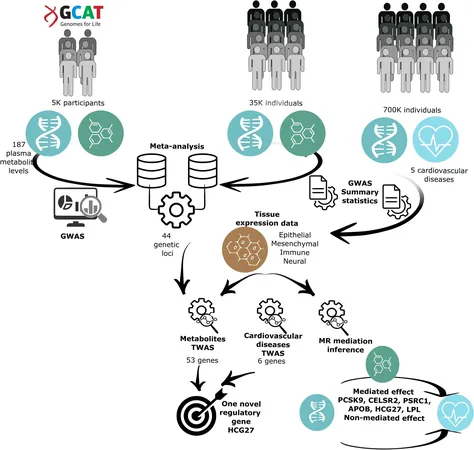
Unlocking Heart Health: Breakthrough Genetic Study Reveals New Pathways to Reduce Cardiovascular Risks!
2024-10-29
Author: Arjun
Introduction
A groundbreaking study has unveiled exciting insights into how our genes influence cardiovascular health by modulating blood metabolites—molecules integral to the body’s biochemical processes. The research, conducted by an international team, highlights 44 genetic regions linked to metabolites associated with cardiovascular risk, offering hope for targeted therapies that could save lives.
Research Details
In an impressive analysis, scientists examined the plasma samples of 4,974 participants from the Catalan GCAT cohort, delving into the levels of 187 different metabolites. To strengthen their findings, they merged this data with extensive genetic databases from 40,000 individuals across Europe. This colossal effort not only pinpoints critical genetic markers but also lays the groundwork for innovative therapeutic strategies.
Genetic Mechanisms
What’s particularly fascinating is how researchers uncovered the interplay between these genetic regions and metabolite levels. By utilizing gene expression panels from 58 distinct tissue and cell types, they pinpointed specific genes responsible for regulating metabolite levels in the bloodstream. This complex genetic orchestra plays a vital role in cardiovascular health.
Expanded Research
To further enrich their research, the team expanded their focus to three additional European studies that encompassed approximately 700,000 participants. This comprehensive approach allowed them to analyze the connections between gene expression, metabolite levels, and cardiovascular events, including heart attacks.
Key Findings
Crucially, the study revealed six genetic loci associated with cardiovascular risks through their modulation of metabolites. This breakthrough, recently published in Genome Medicine, opens new avenues for drug development and personalized treatments tailored to individuals at high risk for cardiovascular diseases.
Expert Insights
Rafael de Cid, strategic project leader at IGTP’s GCAT|Genomes for Life, emphasized the significance of the findings: "These insights not only enhance our understanding of cardiovascular risk factors but also highlight potential targets for innovative drug treatments." He further noted that by regulating blood metabolite levels through gene expression, we might forge new pathways to diminish cardiovascular events, particularly in high-risk groups.
Lipids and Cardiovascular Risk
Lead author Robert Carreras-Torres from IDIBGI explained how their research identifies specific lipids—types of fats that serve as mediators between gene expression and cardiovascular risk. This research extends our understanding of cardiovascular health by illustrating the chain of risk factors originating from genetic predisposition and culminating in gene activation and lipid levels in the bloodstream.
Implications for Future Research
This study not only underscores the importance of large-scale genetic research but also signifies a potential paradigm shift in how we approach cardiovascular disease prevention. By identifying key genes linked to metabolites and cardiovascular risk, researchers are paving the way for personalized treatments that could drastically improve outcomes for millions globally, as cardiovascular diseases remain one of the leading causes of death worldwide.
Conclusion
As science continues to unveil the mysteries behind our health, this study serves as a beacon of hope for individuals seeking to understand their genetic risks and improve their cardiac health. The future of cardiovascular disease management could very well hinge on these revolutionary findings!

 Brasil (PT)
Brasil (PT)
 Canada (EN)
Canada (EN)
 Chile (ES)
Chile (ES)
 Česko (CS)
Česko (CS)
 대한민국 (KO)
대한민국 (KO)
 España (ES)
España (ES)
 France (FR)
France (FR)
 Hong Kong (EN)
Hong Kong (EN)
 Italia (IT)
Italia (IT)
 日本 (JA)
日本 (JA)
 Magyarország (HU)
Magyarország (HU)
 Norge (NO)
Norge (NO)
 Polska (PL)
Polska (PL)
 Schweiz (DE)
Schweiz (DE)
 Singapore (EN)
Singapore (EN)
 Sverige (SV)
Sverige (SV)
 Suomi (FI)
Suomi (FI)
 Türkiye (TR)
Türkiye (TR)
 الإمارات العربية المتحدة (AR)
الإمارات العربية المتحدة (AR)